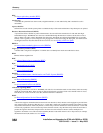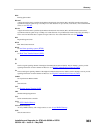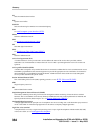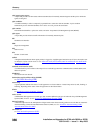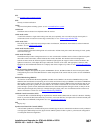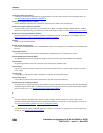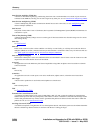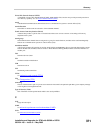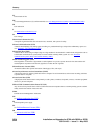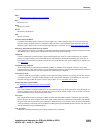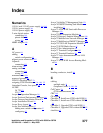
Glossary:
370
Installation and Upgrades for G700 with S8300 or S8700
555-234-100 — Issue 3 — May 2003
time-division multiplex (TDM) bus
A bus that is time-shared regularly by preallocating short time slots to each transmitter. In a switch, all port circuits are
connected to the TDM bus, and any port can send a signal to any other port. See also time-division multiplexing (TDM).
time-division multiplexing (TDM)
A form of multiplexing that divides a transmission channel into successive time slots. See also
multiplexing; time-
division multiplex (TDM) bus.
time interval
The period of time, either 1 hour or 30 minutes, that Avaya Basic Call Management System (BCMS) measurements are
collected for a report.
Time-of-Day Routing (TDR)
A feature that automatically changes access to certain types of lines based on the most favorable usage rates for various
times during the day.
time slice
See
time interval.
time slot
In the switch, a time slot refers to either a DS0 on a T1 facility or an E1 facility, or a 64-kbps unit on the time division
multiplex (TDM) bus or fiber connection between port networks that is structured as 8 bits every 125 microseconds. See
also digital signal level n (DS-n)
; E1; T1; time-division multiplex (TDM) bus.
time slot sequence integrity
The situation whereby the N octets of a wideband call that are transmitted in one T1 frame or one E1 frame arrive at the
output in the same order that the octets were introduced.
to control
An application can invoke Third Party Call Control capabilities using either an adjunct-control association or domain-
control association.
TOD
Time of day
to monitor
An application can receive event reports on an active-notification, adjunct-control, or domain-control association.
tone ringer
A device with a speaker that is used in electronic telephones to alert the user.
TOP
Task-oriented protocol
TOS
See
Type Of Service (TOS).
Transmission Control Protocol (TCP)
A connection-oriented transport-layer protocol, IETF STD 7. RFC 793, that governs the exchange of sequential data.
Whereas the IP protocol deals only with packets, TCP enables two hosts to establish a connection and exchange streams
of data. TCP guarantees delivery of data, and also guarantees that packets are delivered in the same order in which the
packets are sent. See also Internet Protocol (IP)
.
traveling class mark (TCM)
A code that accompanies a long distance call over the telephone network. The distant system uses the TCM to determine
the best available long distance line that is consistent with the user’s calling privileges.



